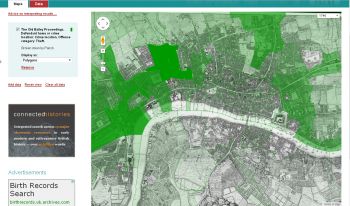Professor’s London history project wins award
Posted on behalf of: School of History, Art History and Philosophy
Last updated: Tuesday, 14 January 2014

This map uses historical data from the Old Bailey to show the locations of thefts in 17th- and 18th-century London.
A University of Sussex professor’s project to map London’s history has been given a national award.
Locating London’s Past – a collaboration between Sussex’s Professor Tim Hitchcock, Robert Shoemaker (Sheffield), Matthew Davies (CMH, London) and the Museum of London Archaeological Service (MOLA) - was awarded the 2014 Prize for Digital Histories by the British Society for Eighteenth-Century Studies (BSECS) last week (Wednesday 8 January).
His award-winning project enables historians to search a wide body of digital resources relating to early modern and 18th-century London, and to map the results on to a web-based version of John Rocque's 1746 map, which has been described as the most detailed and accurate map of 18th-century London ever produced.
Records of crime, poor relief, taxation, elections, local administration, plague deaths and archaeological finds can all be searched and mapped on the site.
The project allows researchers to relate an 18th-century representation of the metropolis to the first accurate Ordnance Survey map of London (1869-80), within a modern Google Maps environment.
The BSECS Prize for Digital Resources is awarded annually to the best resource supporting 18th-century studies.
The award was presented at BSECS’s annual conference at St Hugh’s College, Oxford.
This is the second of Professor Hitchcock’s websites to have received this award; his and Robert Shoemaker’s London Lives site won it in 2011.
Professor Hitchcock joined Sussex in November from the University of Hertfordshire, where he was founding director of the Social Science Arts and Humanities Research Institute.
He has published 10 books on the history of poverty, sexuality and street life, primarily focused on 18th-century London.
As Professor of Digital History, at Sussex he will be working on a five-year project, funded by the Arts and Humanities Research Council (AHRC), looking at the global impact of London punishments between 1780 and 1925.
Called The Digital Panopticon, the £1.7 million project is a collaboration between Sussex, Liverpool, Oxford, Sheffield and Tasmania.
A short video about the project can be viewed on the BBC website.
Professor Hitchcock says: “The Digital Panopticon will tie together the lives of 66,000 men and women caught up in Britain's global empire of incarceration and punishment, and make them available for analysis in a single, freely available web resource.
“It will tie the London working class to the experience of criminal transportation to Australia, and the system of prisons in the UK.
“In the process, it will underpin the writing of a new 'history from below' that encompasses both mass human migration, and the details of everyone and the everyday.”

